![[Home]](https://ludism.org/logo/sclogo160.png)
Last edit
Summary: \#pragma section-numbers off ->
Changed:
< #pragma section-numbers off
to
>
Seattle Cosmic met again at 5:00 PM on 19 April at the apartment of Marty and Ron in Kent. Present in rough order of arrival were Ron_Hale-Evans? (that's me); ChadUrsoMcDaniel; Jay_Lorch?; Alex_Swavely?; Tim "AlphaTim" Schutz; Nat_Dupree? and Steve_Dupree?; Marty_Hale-Evans? and Alex_Rockwell?; Dave_Howell? and Eric_Yarnell,_ND?; and Mark_Haggerty? and his (newcomer) friend Heather.
I make that 13 players, slightly less than usual for game nights at our apartment, because many Seattle Cosmic members were busy most of the day helping Kisa_Griffin? and Meredith_Hale? move into their new apartment in Tacoma. Until 6:30, there were only four people present, and Mer and Kisa never did come to play, because they were exhausted.
--Ron_Hale-Evans?
Ron quietly participates in the first BANG! of the evening.
The first person to arrive at game night (besides me) was Chad McDaniel, around 5:15. He was followed within 15 minutes by Jay Lorch and Alex Swavely. We chatted and waited a little while for someone else to show up, but no one did, so we started a game of BANG!? around 5:50. Chad and Alex had never played and were eager to try it. I got sucked in too. As can be seen in the table below, Jay won as the Renegade. By the time the game was over, AlphaTim Schutz had arrived, bearing a big box of giant, rollable plastic dice for the PrizeBag, two of which Jay received for his victory.
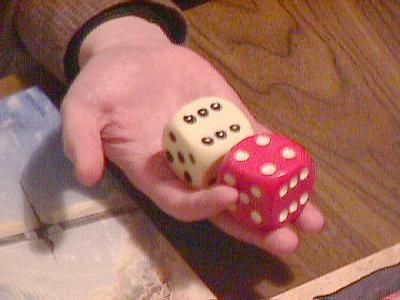
Now he can take a big chance.
Two more games of BANG! were played later in the evening, from about 11:15-12:15. Did anyone receive prizes for these games?
Scores
| PLAYER | GAME 1 | GAME 2 | GAME 3 |
| Nat Dupree | n/a | Outlaw | Renegade |
| Steve Dupree | n/a | Sheriff | Outlaw |
| Ron Hale-Evans | Outlaw | n/a | n/a |
| Dave Howell | n/a | Deputy | n/a |
| Jay Lorch | Renegade | n/a | Deputy |
| Chad McDaniel | Outlaw | n/a | n/a |
| Alex Rockwell | n/a | Outlaw | Sheriff |
| Alex Swavely | Sheriff | Renegade | Outlaw |
Key:
Bold: Player won that game.
Italics: Player was killed.
Bold Italics: Player was killed, but their side won anyway.
--Ron_Hale-Evans?
It was fun, but I'm not yet sure what all the fuss is about . . .
--Dave_Howell?
We played two games in the latter part of the evening. The first was over so quickly that we decided to play another. I don't remember too many details, but I know that I was the Sheriff once and an Outlaw once, and both times I lost miserably.
--Steve_Dupree?
In the first game, Nat and I were outlaws, and both of us were next to the sheriff. I played dynamite. It went aourn a couple times and then blew up the sheriff, putting him at 1 health. Nat and I then opened fire and killed him.
In game number two, I was the sheriff. Again, both outlaws were to the sides of the sheriff. My power was that whenever I was hit, I got to draw a card. Willie the kid was to one side of me, and kept shooting we with Bang! cards. I took a couple hits, but kept drawing missed cards and beer with my ability, and thus stayed in good health. The outlaws were taken down by me, Jay and Nat. At that point I felt my only chance to lose was if I killed my deputy. I felt that Jay was probably my deputy, but there was always a chance that it was in fact Nat. Thus, I stayed strong and waited while Nat and Jay duked it out.
Nat was in the stronger position, and I felt it more likely that Jay was my deputy, due to a couple of his actions, and thus I took a few shots at Nat to keep them even. Finally, Nat killed Jay, and I then immediately killed Nat with a Gatling and Bang. I had been hoarding a good hand of Gatling, Bang, Missed and Jail, or something like that, and was at full health, just waiting for them to resolve who was who. ;) I figured that a dead Deputy still won anyway, so there was no harm in letting my deputy die to avoid the chance that I would attack and kill the wrong person. (Its a game after all!)
No prizes were awarded for those two games of Bang! I didnt know we were still giving prizes for Bang. Do I have even more giant dice coming to me?? ;)
Also: Grats to Jay on the Renegade win. Still, it was another 4 player Renegade win (which is actually easier than a 4 player Sheriff win). So we still dont have a Renegade win with more than 4 players.
--Alex_Rockwell?
Despite working for Microsoft, Jay falls short when it comes to being an Evil Genius.
After AlphaTim arrived at 6:30, we now had five players with a yen for action and adventure. What could be more natural than to take down Before_I_Kill_You,_Mister_Bond...? (Better Edition) from the shelf, where it was staring at us, daring to play it?
I have never thought of this as a particularly strategic game, but tonight seemed to be largely a luckfest. Some good card draws and refusals on my part to prematurely taunt the Spies that entered my secret Lair (that is, taunt them before the matching Taunt cards that could cancel my own Taunts were already played or safely in my own hand), took me to an early lead. Unfortunately, some LederHosen allowed Chad, who had some good cards, to leap ahead of me. After all, his Lair had some Tasty Fruit, while mine had only a Luxury Yacht (which was named the Throatwarbler Mangrove).
Chad did indeed win the game, for which he was awarded Landyland?, a CheapassGames freebie that incorporates your spare Land cards from Magic:_The_Gathering?. Jay scored a remarkable zero points, and commented that this would provide further fuel for his debate with Dave Howell on the CheapassGames page.
Scores
| PLAYER | SCORE |
| Chad McDaniel | 21 |
| Ron Hale-Evans | 14 |
| AlphaTim Schutz | 9 |
| Alex Swavely | 8 |
| Jay Lorch | 0 |
Comments from the players?
--Ron_Hale-Evans?
The reason for my score of zero is that I never drew any lair cards. Literally, there is absolutely no way to score any points if one does not draw any lair cards.
That said, the game had a funny enough concept and cards that I enjoyed the game. Of course, next time I play I'll know the cards and it likely won't be much fun at all. Then again, "the next time I play" is hopefully a phrase referring to a non-existent point in time.
--Jay_Lorch?
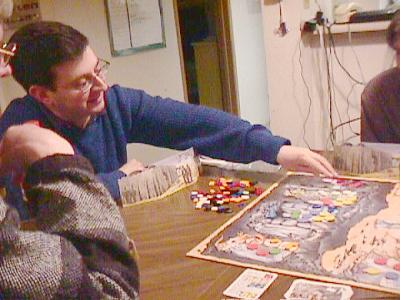
Dragonmaster Jay
After our half-hour dalliance with Mister Bond and the deadly Miss Enchilada Progress, Nat and Steve Dupree, Marty Hale-Evans, and Alex Rockwell arrived, so five of us (Alex R, AlphaTim, Chad, Jay, and Ron) started a game of Aladdin's_Dragons? around 7:15. I was eager to play this, because it had sounded to me like multiple games of Raj? being played simultaneously. Although Tim and I had never played (Tim had read the rules), we decided to jump into the advanced game. This proved to be a mistake. Jay obtained a strong early lead that could probably never be overtaken, so the rest of us quickly conceded to him. Jay declined a prize.
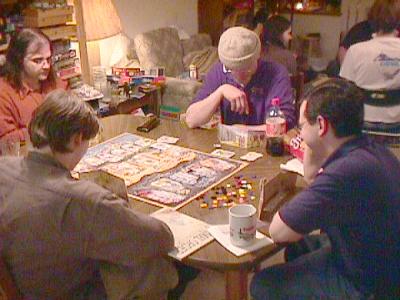
Chad, Alex, and Tim say a short prayer for victory over Jay.
The rest of the players were ready for more punishment in another advanced game, but I was not. I sat out and Alex brought me the rule book to read. After leafing through it, I tended to agree with Alex's comment in the first game that the basic game is better than the advanced one. The basic game approaches the purity of Raj?, but the advanced game tacks on a lot of items and cards with special powers that seemed rather ad hoc to me. "Too much clay", as Dave Howell would say (quoting James Ernest).
Alex won the second game and was awarded some giant dice (that is actually his hand you see above in the BANG! section).
Scores Game 1:
| PLAYER | SCORE |
| Jay Lorch | 7 |
| Alex Rockwell | 2 |
| AlphaTim Schutz | 2 |
| Chad McDaniel | 2 |
| Ron Hale-Evans | 2 |
(All players conceded to Jay at this point)
Game 2:
| PLAYER | SCORE |
| Alex Rockwell | 9 |
| Jay Lorch | 6 |
| AlphaTim Schutz | 5 |
| Chad McDaniel | 4 |
--Ron_Hale-Evans?
In game 1, Jay got out to an incredible start. In the first round, it looked like Jay and I were both going to win 2 artifacts, with one other player winning one. After Jay won his Flying carpet artifact (the 3), he placed it in the next palace space and overbid me for that artifact (another 3). I hadnt realized that the carpet could be used on a space you didnt have any pieces, and that he could thus use it to come in on any palace square with a bid less than 4 and win the artifact.
Using all the powers he got in round 1, Jay went on to score another three artifacts in round 2, again killing us in the palace with his carpets. With the score 7-2-2-2-2 counting the artifact you start the game with, we all conceded, as the average score in Aladdins Dragons is always going to be six, and with half the points out, Jay hada 5 point lead. We wanted to play agian, now that we understood how the powers worked.
In game 2, things started much more evenly, and the powers were more fairly distributed at the start. I managed to pull into the lead in the middle. In one round I managed to win 14 gems (and an artifact as well), which I was then able to use in the next round to win 3 artifacts. Going into the last round, there was one artifact left (which had gone unpurchased one round due to a spell card removing all the tokens in that space). I was afraid that Jay would tie me at 8-8 if he got the artifact, and thus win because he had more scrolls. I had two spell cards that could effect the outcome of the space, and thus felt fairly confident that I should win it with my bid of 10 gems. It turned out that the spells were unnecessary, as no one could beat my bid. When we revealed our scores, Jay had one less point than I had feared, and thus the game hadnt been in doubt after all.
--Alex_Rockwell?
I'd like to say a few words in response to people's stated preference for the basic game.
The first time I played Aladdin's Dragons we played the basic game, and I didn't like it. Fortunately, someone told me the basic game is very different from the advanced game and that I'd probably like the advanced game better. I tried it, and indeed I liked it so much I bought the game.
It's kind of odd for me to prefer the more chaotic form of a game, but in this case I find the basic game too simple to provide much excitement. Raj probably gets away with its simplicity because it's short.
--Jay_Lorch?
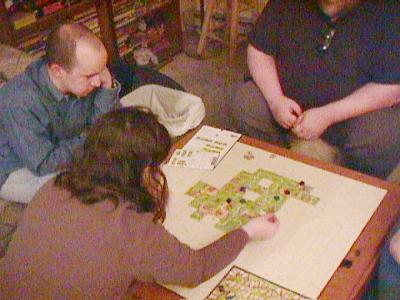
Holes in the board mean megapoints for the next player to draw a Monastery.
Meanwhile, four people started a game of Carcassonne around 7:30. I had recently bought Expansion 2, Carcassonne:_Traders_and_Builders? and Marty was eager to try it. Unfortunately, neither of us had read the rules to it yet, so the four players settled for playing with just Expansion 1, not even using Carcassonne:_The_River? (Expansion 0).
Steve Dupree was the big winner here. His secret? Farmers, farmers, farmers. I believe he selected some giant dice as his prize.
Scores
| PLAYER | SCORE |
| Steve Dupree | 143 |
| Nat Dupree | 115 |
| Alex Swavely | 110 |
| Marty Hale-Evans | 95 |
--Ron_Hale-Evans?
Actually, I didn't have any farms until late in the game. Late in the game, I surreptitiously slipped a farmer of mine into a large field to prevent Nat from being the only one who got the huge number of points it was destined to award. Alex saw what I did and joined a previously existing farm of his up to get in on the fun. The only player left out in the cold was Marty, who attempted to join up with the farm too but, as was the case for her the entire game, was not able to draw the tile she needed.
--Stephen_Dupree?
I liked playing this game, and early on, my thought was "Dan_Crouch? would totally dig this game," so I went and bought it at Gary's Games (which is three blocks from the house we live in).
Indeed, not only Dan likes it, but my other two housemates now are really easy to goad into playing a game of it.. The "River Expansion" is the favorite method of starting the game over here.
--Alex_Swavely?
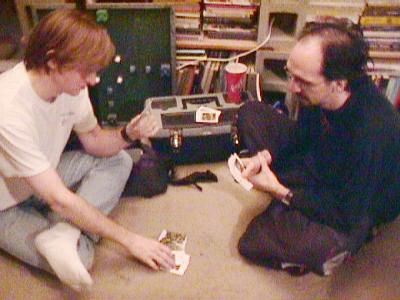
Chummy Rummy.
Dave Howell and Eric Yarnell arrived around 8:00, and since everyone else was engaged elsewhere, started a game of Gin_Rummy?. I don't know who won or whether they even finished the game. I did manage to snap some photos of Eric's own Emergency Game Kit; I hope he'll add some commentary to the photos on the EmergencyGameKit page soon.
--Ron_Hale-Evans?
We definitely didn't finish. Eric was keeping score on his Palm, but mostly it was a way to amuse ourselves while waiting for a game to break up.
--Dave_Howell?
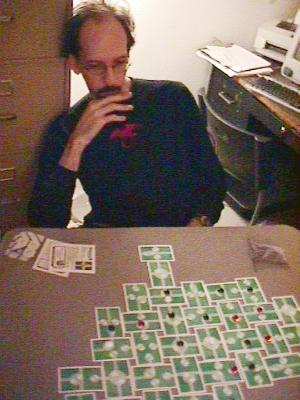
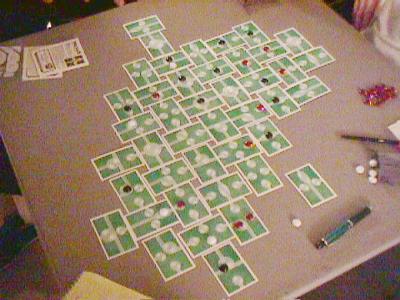
1. Dave presides over the Nexus board.
2. Nexus endgame.
Around 8:30, Dave, Eric and I started a game of Nexus?. This is one of the series of Hip Pocket Games from CheapassGames. It was interesting. I haven't got many games in this line myself, except for the Very_Clever_Pipe_Game?, but Dave also brought out Agora for a quick demo, and I decided I'd have to look into them further.
Nexus is a sort of connection game. Players lay down cards containing nodes and tunnels connecting them. Some cards are dead ends and serve to "cap" the tunnel complexes they are attached to; others extend the tunnel complex in question even further. After laying down a card, a player adds a stone to a node in one of the tunnel complexes that is still open. When a tunnel complex is fully capped, the player with the most stones in the complex scores one point for every empty node in the complex. This means that the harder you fight for a complex, the fewer points you'll score for it, all else being equal -- the nodes you would score are filled with the stones of you and your opponents.
After watching Dave struggle to score a big complex, and Eric keep branching it so that Dave could not cap it, I decided this was more a tactical game than a strategic one, meaning I should expect to do well at it. And indeed, I scored 1 or 2 points (mostly 1 point) on almost every turn, by capping small tunnels. (Dave did finally manage to score a big 5-point complex, but it was the only thing he scored all game). Winning requires 10 points; right after I reached 9 points, Eric scored 3 points and leapt from 7 to 10 points, winning the game. He pointed out one mistake I made, where I could have scored 3 points instead of 1, by rotating a card 180 degrees. Oh, well. I'd like to play this again.
We nearly ran out of cards. Dave (who owned the game) wasn't sure what the rules said about that contingency, but he commented that in future games, we'd probably spot the 2- and 3-point opportunities faster, and reach 10 points much sooner.
The game only took half an hour. Eric declined a prize.
Scores
| PLAYER | SCORE |
| Eric Yarnell | 10 |
| Ron Hale-Evans | 9 |
| Dave Howell | 5 |
--Ron_Hale-Evans?
Ron simplified the scoring mechanism a bit in his description. Each node is worth 1 to 4 points; a node's value is equal to the number of connections to/from it. This value is both for scoring and for determining the winner of a complex. So when Ron would drop a stone in an end cap (worth 1 point) he was betting that somebody else wouldn't attach a 2 or 3-way node to that cap, drop a stone in it, and promptly take the point lead in the resulting complex. Or that if that did happen, he'd be able to retake control. Or prevent the other player from being able to complete it. Or score more points elsewhere while they were trying to close it up.
At one point in the game, I believe the big complex that I had control of needed only an end cap to close and score me 11 points. Alas, I didn't flip the card I needed to close it, and Eric added a forking card to give it more ends. He also appeared to be playing to shrink me, in that, even if you don't think you can gain control of a complex, if you place stones in it, you're depriving the owner of potential points. However, he managed to play enough 'spoiler' stones in that thing that he actually took control of it away from me when I was busy elsewhere on the board. I noticed before he could close it and score it, and took control back, but then he just played another multi-way card onto the end, ensuring I'd never get it capped off.
Although Nexus isn't my favorite Hip Pocket Games, I admire how its rich tactical situation arises from very simple rules, and the fact that the required 'basket weave' tile structure is an elegant way to subtly reduce the play options of each card.
--Dave_Howell?
Thanks for the correction, Dave. I had a vague sense when I was writing the description that I was missing something.
--Ron_Hale-Evans?
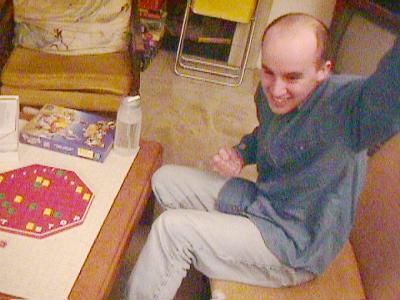
Steve D finally stops -- gleefully!
Around 8:30, after Carcassonne, Nat and Steve Dupree played a half-hour game of Sid Sackson's classic push-your-luck dice game, Can't_Stop?. Steve won, and was awarded a copy of Landyland?. You can see his jubilation in the photo above.
I think the Duprees have the right idea. If you play games only with your significant other at game night, your household is guaranteed to bring home prizes. ;)
--Ron_Hale-Evans?
I would have declined a prize, but Nat was really itching for a copy of LandyLand?, despite the fact that I sold all but one deck's worth of my magic cards to Kisa 6 months ago. An interesting thing about this game was that I won by claiming columns 2, 11, and 12, three of the four lowest-probability columns. I had 6 and 7 well advanced also, but only because I had been using them as a safe haven while I tried to move the other columns up.
--Steve_Dupree?
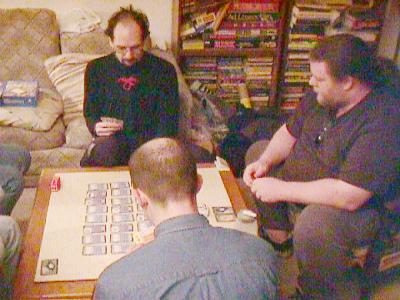
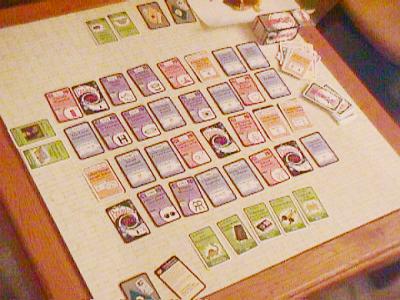
1. Dave presides over the table (again).
2. Eddies in the space-time continuum. (Is he, is he?)
Around 9:10, the Duprees, Dave Howell, Eric Yarnell, and Alex Swavely started a 45-minute game of Chrononauts, the TimeTravelGame from Looney Labs. Eric won, but declined a prize.
Alex, Dave, and Nat immediately started another Chrononauts game. I don't have info on who won this one, or whether they got a prize. Comments from the players?
--Ron_Hale-Evans?
Marty and I were both feeling tired and sick (I had a cold). We tried hanging out in the bedroom with the dogs for a few minutes, but were afraid that if we both disappeared, people might think they were unwelcome and start going home. We therefore moved to the computer room (a.k.a. the Data Ops Command Center), read some email, and quietly listened to the gaming chatter from the living room. I had commandeered the main table for Decay and Cosmic_Encounter? for after the second game of Aladdin's Dragons, so around 9:45, AlphaTim, Eric Yarnell, Marty and I started playing Decay.
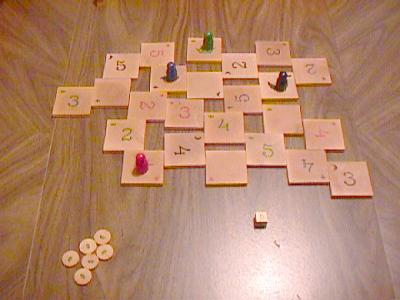
Setup for Decay
This review of Decay is part of Seattle Cosmic's ongoing effort to playtest and review as many piecepack games as possible, at least one a week. We're starting with the games that look most promising first. Decay received a sort of honourable mention in the Changing Landscapes piecepack game design contest. Mike Schoessow, the judge for the contest, wrote,
Decay certainly was different, and it was meaty. Our game lasted almost two hours, and most of us were thinking hard throughout the game. However, we found it rather "fiddly" (to use a technical term) and wished the designers, Robert Mundschau and Matt Heistad, would streamline it in a future revision.
Rather than reinvent the pointed stick, let me quote the succinct summary of the game included in the rules (slightly edited):
An imaginative idea for a game, yes? Unfortunately, some of the rules are so fiddly that not only did we have trouble remembering them, but apparently so did the authors. For example, the diagram illustrating Rule 1a, "You must place your tile in contact with at least one other tile already placed on the table" shows two piecepack tiles lying flush with each other. However, Rule 1c states, "You may not place a tile so that it completely shares one edge with the entire edge of another tile", and the illustration for that rule shows a counterexample that is nearly identical to the example for Rule 1a!
Similarly, the rules for moving a tile state, "To be available for moving, the tile may not be touching other tiles on more than 2 adjacent sides", but one of the two counterexamples in the illustration shows a tile unavailable for moving that is only touching other tiles on two (opposite) sides. It seems clear that the authors had something definite in mind here, but had trouble expressing it. AlphaTim suggested that the next version of the game (if there is one) should drop all rules about adjacent sides, and simply state that a tile cannot be moved if it is touching other tiles on three or four sides. Much less fiddly.
I suppose I am partly to blame for the confusion we experienced while playing Decay. We were working from three sets of rules: the official rules as entered in the Changing Landscapes contest, a player aid created by Mike Schoessow, and my own annotated copy of Mike's player aid. All three of these rulesets stated the rules slightly differently, and it wasn't always clear whether they contradicted one another. However, it certainly would have helped if the primary ruleset didn't contradict itself.
I don't want you to think Decay wasn't fun. It was, or we would have quit well before we spent two hours on it. However, there are still a couple of negative things we noticed about the current version. One is the imprecision of movement of the tiles. Even on a relatively non-slippery table, the other tiles tend to shift around when you move one. The rules state "tiles may separate a fraction of an inch from each other. For the purposes of the game, they are still in contact. In other words, don't be a weenie!" In my opinion, any game that needs to incorporate etiquette as part of the official rules (such as the injunction to "be cool" in Icehouse proper, another "positional" game with similar problems) has a basic flaw. Further on the imprecision issue, it's not always clear whether a tile you are moving will fit into a new location on the board without trying it -- and thereby jostling the board. The Heisenberg Uncertainty Principle at work! Perhaps the name "Decay" refers to the decay of subatomic particles?
Eric made the first attack of the game, stealing one of my coins. This gave the other three of us the idea to rob him in return. Before too long, he was down to very few coins, meaning he couldn't pay to move tiles or his pawn far. (I guess he isn't a Vulcan. Oh, never mind.)
Marty was also hoist by her own petard. She was the first to remove a tile and split off part of the board. The smaller part, which contained my Ace (an important tile because Aces are unassailable), was discarded, and the board shrank. However, she was caught in an outlying area of the board, which Tim and I cooperated to isolate and split off. Marty's "island" was discarded and Marty was the first player to be eliminated from the game. (See the photos below.) It is important to stay as close to the center of the Decay board as you can, all else being equal.
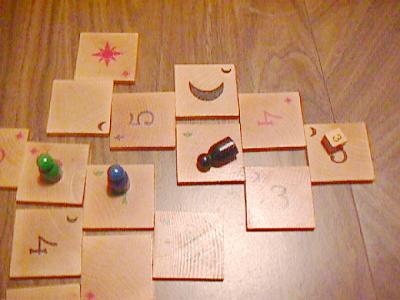
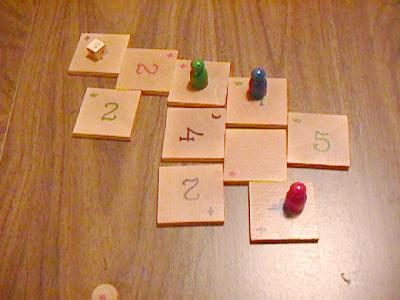
1. The black pawn (Marty), realising it is on a doomed island, swoons melodramatically.
2. Now the board is smaller!
Tim and I repeatedly robbed Eric until he had no coins and couldn't move his pawn at all. Eric was therefore eliminated second. I ended up with the greater part of the "money". Tim and I then took turns shrinking the board until there were only three tiles left. We agreed to a draw because each of us could always move from his current tile to the one empty tile (pawns cannot share tiles), and neither of us could use any of the tiles to attack the other and rob him until he was paralyzed. Eric suggested I should shout "What is the tiebreaker?" as I have been known to do when tied for first place, but it wouldn't have helped; there isn't one. Marty suggested that the tied player with the most coins should be the winner, since theoretically he has the most freedom of action. In any case, while the rules state that draws are rare, we encountered one in our first game.
Elsewhere in the room they were playing BANG!?, but our game ended with a fizzle. Still, it was exciting up until the very end; Marty and Eric stayed to watch the rest of the game, even though they could have played something else. The consensus was that although Decay has a lot of potential, it's kludgy. To sum up, Eric quoted James Ernest of CheapassGames again: "Too much clay". I'd like to play Decay again (would I have devoted this much space to it if I didn't enjoy it?), but I think I'll wait until the authors clean up the rules.
Scores
| PLAYER | SCORE |
| Ron Hale-Evans | draw |
| AlphaTim Schutz | draw |
| Eric Yarnell | eliminated second |
| Marty Hale-Evans | eliminated first |
Here are the rules for Decay.
Comments from the players?
--Ron_Hale-Evans?
Actually, I didn't have much fun at all playing Decay. I do think the movement rules are very clunky and difficult to use, partly because they have so many limitations that seem arbitrary and partly because it's so difficult to tell whether a potential move is actually legal. Because you can move tiles fractions of inches, and placement is very unstructured, it's difficult to really ascertain what's touching what where, especially if the tiles happen to drift apart even a tiny bit as they're being moved. Added to the confusion about what the rules actually were, it got very frustrating very fast.
On top of this, I really didn't see the structure of the game clearly. I play a lot of games, and I'm used to playtesting games; usually, even if I don't play well or don't like a certain game, I can see what the designer was up to and how the game probably should be played. With Decay, it seemed a lot like someone decided to put together a bunch of limitations and see if anyone could find a way to move effectively anyway. Perhaps that's not fair, but it's my perception. The movement limitations were so byzantine, and there were so few ways to affect other players besides indirect movements, that it quickly became more frustrating than fun to devise some way to have any effect, never mind actually eliminating other players.
If the rules could be clarified, I might try this again, but on first impression a thumbs-down from me.
--Marty_Hale-Evans?
L-R: Steve and Alex get Wasted.
Meanwhile, the four players in the table below played a game of Industrial_Waste? in the computer room, from about 10:00-11:00. Since I was absorbed in Decay at the time (eww), I don't have scores or prize info. Comments from the players?
Chad left around 11:05, after this game. As he left, I remarked that I didn't think Cosmic_Encounter? was going to get played, even though it was supposed to be a CosmicNight.
Scores
| PLAYER | SCORE |
| Alex Rockwell | 54 |
| Steve Dupree | 51 |
| Jay Lorch | 51 |
| Chad McDaniel | 40 |
--Ron_Hale-Evans?
This was the first time playing Industrial Waste for Chad, Steve and I, and Jay started out with the rules and some strategy advice. During the game, all of us followed a strategy of first reducing pollution, follwed by work force needed (through automation). Chad produced a bunch early on, putting him into the yellow zone on pollution. He was gambling that an accident would not happen, and he would have time to clean it up. Unfortunately, two accidents occured in the next two turns, shrinking his company and forcing him to pay fines, which effectively put him out of the running. The other three of us were neck and neck the whole game, until the final turn when I was able to use a Double card with an Innovation to reduce my labor force from 3 to 1 worker units, completing that track on the advancement table. I thus completed two tracks, for 15 points each, while Steve and Jay each had only one complete for 15, and one halfway complete for 6. Their companies were slightly larger than mine, and had a little more money at the end, but it wasnt quite enough to balance my 9 point lead in the advancement charts.
I look forward to trying this one again sometime! I also feel that unless players get some bad luck, like Chad did, scores will most likely be quite close, and that small efficiencies in play will be quite important. In that respect, I think its similar to Princes of Florence, where you can expect to get a score within a certain range if you make no serious mistakes, and then whichever player did things the most efficiently (paying less on auctions, etc), will have a few more points.
But as this was my first play of Industrial Waste, I dont really know if that's accurate.
I want to try out different strategies in this game, such as a strategy of winning raw materials auctions early, then reducing pollution output and raw materials necessary to produce, and then producing like crazy later on.
--Alex_Rockwell?
Indeed, Industrial Waste does offer the possibility of trying several different strategies. I've tried the "go into a lot of debt early on" strategy, and it worked quite well. I've tried the "get points from things other than innovation, which tends to be valued highly" strategy, and it's also worked (though in this case I should admit I only used this strategy of necessity since everyone was grabbing innovation so much I didn't have much choice but to pursue another avenue to victory). I like Chad's "risk inspections when the deck will be reshuffled since there's only a 1/3 chance or so" strategy, and although it hurt him this game due to some bad luck I've seen others (luckier others, I guess) do well with it.
The game has a fairly small set of rules from which derives a lot of interesting tactics and strategy, which in my mind is precisely what I'm looking for in most games.
--Jay_Lorch?
Three players started a second game of Carcassonne around 11:05, using only the first expansion, as before. The scores are listed below. Dave Howell selected a pair of giant dice as his prize.
Scores
| PLAYER | SCORE |
| Dave Howell | 155 |
| Nat Dupree | 126 |
| Alex Swavely | 86 |
--Ron_Hale-Evans?
My secret? Farmers, farmers, farmers.
--Dave_Howell?
Around 11:40, our dogs Gwenyth and Tia started barking unusually loud and long from the bedroom, where we keep them during game nights. I went to quiet them down and was surprised to realise they were barking because someone was knocking quietly at the door. It turned out to be SC regular Mark Haggerty and his friend Heather. They were returning from a party and decided to drop in to see whether anyone was still playing games. We were. We looked for a simple game that wouldn't require too much explanation for Heather's sake (she had never been to a gamer geek's house before, bless her), and chose another game of Can't_Stop?. The original Parker Brothers "stop sign" edition comes with playing pieces for only four gamers. However, it is common knowledge among spielfrieks that the game Advance_to_Boardwalk? contains identically-shaped pieces in several extra colours, and that you can add the extra pieces to Can't Stop to extend the game for several more players. Of course, the game is only "rated" for four players, and if more players play, the board gets crowded pretty quickly, and people "crap out" more often. However, that's part of the charm of playing with extra players. I wouldn't want to do it every time I played Can't Stop, but once in a while is fine.
Tonight we had seven players for most of the game: Dave Howell, Eric Yarnell, AlphaTim Schutz, Marty Hale-Evans, myself, Mark Haggerty, and Heather. We played until about 1:00 AM (with so many players, the game lasts longer than usual). The Duprees, the two Alexes, and Jay all left before our game started, so everyone remaining was playing Can't Stop. After about an hour, with no end in sight, AlphaTim said he had to go home, so we swapped his green pieces with Heather's "banana" ones, which were easy to confuse with my "lemon" ones from the basic game.
For a while, it looked as though the game would be a five-way tie, with five people each claiming two of the 11 columns, and one person claiming the 11th. Toward the end, people were crapping out on almost every roll, and if they didn't, they would move only one or two pieces, just to make a little progress. The end game with six players was definitely more luck-based than with the standard four or fewer players. Eventually, Marty succeeded in locking down the 11th column, and won the game. She selected a pair of giant dice (what else?) as her prize.
I'm sorry that I don't have a photo of the insanely crowded board, but my camera ran out of charge before we started playing.
Comments from the players?
--Ron_Hale-Evans?
Dave and Eric left around 1:15, while Mark and Heather stayed to chat a few more minutes. Heather was fascinated by Marty's Jonathan_Livingston_Seagull? game, which Marty had bought as a curiosity when she was a teenager, and characterised as "a weird game -- it's not competitive, but it's not cooperative either". Then Mark and Heather left around 1:25, and Marty and I were home alone with Gwenyth and Tia.
Once again, there were no drive-by shootings this week. I believe our game club has an excellent record in this regard. I'd like to thank everyone who helps make it possible. Thanks also this week to Marty Hale-Evans for light editing, most of the captions, and the title. Thanks go to Chad McDaniel for several photos as well.
Saturday, 26 April 2003, 5:00 PM at the house of Tim Higgins in Mill Creek (Bothell). Come play for fun and FABULOUS PRIZES from the PrizeBag!
Remember, Seattle Cosmic Game Night occurs every weekend, in one of three locations: Kent, Mill Creek, or Tukwila. Email Ron Hale-Evans for a full schedule and directions. If you come, please bring a snack or drink to share (cookies, chips, soda, juice, etc.)
GamesToTheRescue is a philanthropic project of the Center for Ludic Synergy and Seattle Cosmic Game Night. The aim of the project is to provide game rules and equipment to hospitals, for use by patients and visitors. You can support GamesToTheRescue by buying games via our Funagain affiliate program, buying Seattle Cosmic Gear, and in a number of other ways. See the GamesToTheRescue page for more details.